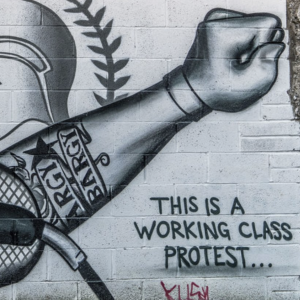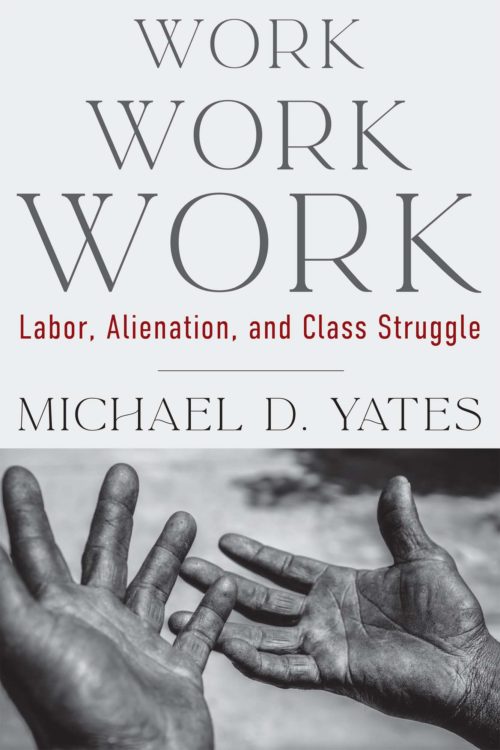Work Work Work:
Labor, Alienation, and Class Struggle
by Michael D. Yates
216 pages / 978-1-58367-965-4 / $19
by Susie Day
Michael Yates is a labor organizer, educator, and economist who writes about economic inequality and workers’ rights. His latest book, Work Work Work: Labor, Alienation, and Class Struggle, focuses on the effects of work on the human spirit. This world of “work”—where we worry about losing the very jobs we often hate—shapes and misshapes our lives and, according to Yates, should be overthrown.
I recently spoke with Yates by Zoom to discuss the book and his experiences growing up in a working-class family.
If unions and labor organizations don’t deal with issues of racism, patriarchy, and imperialism, we’ll be in a bad way.
Q: Can you tell me a little about your background?
Michael Yates: I was born in a mining town in Pennsylvania. My dad worked in a glass factory. When you grow up in a place like that, nobody’s encouraging you to go to Harvard or fulfill your dreams; you’re expected to work. So when I was twelve, I got a paper route. I always worked.
I was the first in my extended family to go to college. My dad and most of my relatives were in labor unions, so I studied labor economics. I started teaching college in 1969 in Johnstown, Pennsylvania—the center of the steel industry. The Vietnam War was underway, and the protests against it were heating up. I wasn’t what you’d call “radical,” but well on my way.
I was inspired by the veterans that came back and opposed the war. I faced the draft myself, so I started reading about Vietnam. What the Vietnamese people were doing was inspiring. [They] made me think about what the hell was going on in this country, which segued into teaching about work. All those working-class men from my hometown were sent to Vietnam. Once you see one kind of oppression, you start to see others.
Q: How do you define the working class?
Yates: I see the working class as people who work for wages, who have bosses and hierarchies—people who might conceivably want to change the world. I also include people that don’t necessarily work for wages but whose labor helps create the working class, like my mother. She was a homemaker, raised five kids, and took care of my dad and the neighbors when they were sick. If she’s not working class, who is? Unemployed people are in the working class, obviously. Small farmers, or peasants—there’s roughly two billion in the world—are necessary to any kind of collective struggle. Now, if you’re a lawyer shilling for General Motors, helping market an unsafe product, I don’t consider you working class; you’re an ally of capitalism.
unnamed.
Q: You write that work often psychologically harms workers. For instance, employees are easily shamed and manipulated—and that these injuries redound into families. How do we begin to take responsibility for our own psychic damage?
Yates: That’s not an easy thing. For a long time, I felt I didn’t have the right to speak up, wasn’t smart enough, others had better educations. But you learn through some sort of struggle, you get angry. It’s in struggles that awareness occurs. But things like fathers harassing their wives and kids don’t go away after a strike. You might have a good understanding that your boss treats you like crap, but that doesn’t stop you abusing your family. Not many people talk about these things. I always ask, When are unions going to educate their members?
Q: You’re not crazy about unions in your book. You say that, as a part of the capitalist system, they’re easily corrupted.
Yates: No question about that. You need different kinds of organizations, like workers’ centers. The Chinese Staff and Workers Association in New York or Immokalee Coalition in Florida are examples. My sons work in the food service industry. Why, in every town, couldn’t there be a center where food service workers could meet and talk about their grievances? Believe me, that’s an industry where work grievances are monumental. Problems of drug and alcohol abuse are rampant, with people getting cut and injured all of the time, treated like dogs, and then pitched out for younger people. If they had a center, they could deal with some of that emotional stress.
Q: Talk about the “panopticon”—an eighteenth-century design for circular prisons, where a few centralized guards peer through windows and theoretically surveil thousands of incarcerated people. It’s since been used as a metaphor for how mass social surveillance functions in modern societies. You use it to explain work conditions today.
Yates: When I was teaching, I’d tell the business majors that the essence of management—what you’re going to be doing—is controlling the workers. I got the panopticon idea from studying the conscious efforts of employers to increase control levels—from when they first herded workers into factories in the early 1800s, to work environments like today’s Amazon warehouses. In the panopticon, nobody knows when they’re being surveilled by their higher-ups in a given moment, so they have to act on the assumption that they always are. Just like monitoring consumers’ preferences, companies are learning their employees’ attitudes and behaviors. One of my sons works in a grocery store; he says there’s at least fifty cameras in that store, watching every move.
Q: You call work “a profoundly alienating endeavor,” which “must be abolished if human beings are to thrive.” What would a world without work look like?
Yates: In one chapter, I mention the idea of the “I” and the “We.” In this society, we’re inundated with “I/Me.” Everybody’s a competitor. But humans have lived 95 percent of our time on Earth in gathering and hunting bands, where the “We” was more important. That has to be the key to any kind of radical change.
The system has to be attacked at all points: prisons, schools, the media, family life. Each struggle is important because it’s tied to the nature of the system, right? But each struggle has to be broad-based. What makes the economy tick? Accumulating capital. And how’s that capital accumulated? By our labor. We are the source of our own misery. That’s teachable—something people could understand.
I have suggestions in the book, projects like the Sikh farmers’ action in India. They wanted to abolish repressive farm laws, so they protested outside of Delhi for an entire year. Police beat them; people died. There was education going on in their encampments, where they had big kitchens set up, brought in tractors. Also communes like in Venezuela, where you gain some control over work by making it collective. It’s important that those activities begin locally and mushroom outward, and that they’re combined with a strong, radical education component, so that people can always be learning.
Q: What about current labor struggles like those against Starbucks and Amazon?
Yates: They haven’t reached a big enough mass yet. My book points out that, during the 1970s, there were 70,000 wildcat strikes in the coalfields alone—lots more than are happening now. For us to win, there’s got to be a magnitude of changes; solidarity that has to be built by everybody.
Q: What about the “white working class?” Many analysts credit it for the rise of Trump and white supremacy. Do you agree?
Yates: No, I don’t. Most white working-class people didn’t vote, for one thing. But, while I don’t think they alone put Trump in power, you can’t deny that white working people played a part. A fairly significant percentage of AFL-CIO members voted for Trump.
Years ago, when I worked for the United Farm Workers Union, some bad stuff happened, and I remember telling my grandmother [about it]. She’d grown up in pretty poor circumstances, and she said, “Remember one thing, Michael. There are bad people among the poor, too.” Sometimes, you can’t avoid the truth that’s staring you in the face.
That’s why I oppose the “class first, last, and only” analysis. It’s way more complicated. If unions and labor organizations don’t deal with issues of racism, patriarchy, and imperialism, we’ll be in a bad way. Every organization has to hit these issues head on. You can’t wait for the “socialization of the means of production.”
Q: What’s the one basic thing you want people to know?
Yates: I want to get across what work is. In the first essay, I write about my father. He’s examining aircraft glass for fighter planes, so the flaws have to be zero or close. But you can’t reject too many; the company would be mad. He’s under high-intensity lights, has three or four cigarettes burning at once . . . it’s stressful. And he gets emphysema, he can’t breathe. When he’s old, he says, “I didn’t think it would be like this, Mike.”
Who does think it’ll be like that? Employers want your body. They want your mind, too. When you can’t work anymore, you’re disposable. I want people to think about their work and their lives. Maybe they’ll be inspired to take some action. That’d be nice.
See Day’s interview with Yates at The Progressive


Comments are closed.